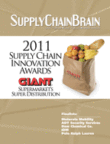
Visit Our Sponsors |
|
|
|
|
|
|
|
|
|
|
|
|
|
|
|
|
|
|
|
|
|
|
|
|
|
|
|
|
|
|
|
|
|
|
|
|
|
|
|
|
|
|
|
|
|
|
|
|
|
|
|
|
|
|
|
|

For distribution centers of all sizes, mobility is increasingly being viewed as critical to a successful operation. That's true even of companies without the need for a full-blown warehouse management system.
Midmark Corp. is a prime example. Headquartered in Versailles, Ohio, the company supplies a wide range of equipment, furniture and fixtures to medical, dental and veterinary offices. It maintains four subsidiaries in the U.S. and others in France, India and Italy, supporting international healthcare markets.
At the Versailles location, Midmark operates three separate manufacturing plants in adjacent buildings. About 850 employees are on site. The distribution operation picks around 5,000 parts a week, with most items shipped out via UPS.
Midmark wanted the capability to deploy mobile devices that would improve picking accuracy. The problem: its enterprise resource planning system, from Oracle Corp., wasn't flexible enough to support the requirements of a mobile supply chain. At the same time, Midmark wanted to extend wireless capability throughout its distribution facility. Yet the company didn't need all of the bells and whistles of a full-function, bolt-on WMS.
The search began for a vendor that could support a mobile operation in tandem with the company's existing ERP. According to project manager Nikki Lange, Midmark undertook a month-long review of four possible vendors. There were 10 criteria to be met: scalability; implementation time in business days; ability to integrate with existing times, in particular the Oracle ERP and Microsoft SQL server; ability to fulfill other business processes; strong references from existing users; degree of risk involved with the investment; ease of working with the vendor's staff; relative cost; overall ease of using the system, and conformance to all elements of the mobile supply chain's pick confirm requirements document.
Midmark Goes With TAKE
Midmark's choice of a partner was TAKE Solutions Ltd., based in Chennai, India with U.S. headquarters in Princeton, N.J. One characteristic of TAKE must have seemed especially attractive to Midmark: the vendor specializes in supporting Oracle applications, and is an authorized Gold-level member of the Oracle PartnerNetwork. But Lange says TAKE really won the contract because of its cumulative ranking on the 10-point evaluation scale. Midmark was particularly impressed by the references it was able to obtain from current users of TAKE's applications. Lange and her team made a point of personally visiting a site of the provider's customer. The experience was "invaluable," she says. "We were able to see and talk to the people who helped implement, use and support [the system]."
Implementation of the software at the first Midmark location was a relatively smooth process that spanned just two months, from March to May of 2011. "It was in line with expectations," says Lange.
There was a certain amount of customization involved. Lange praises TAKE project manager Cristi Blaes for her role as project manager and business analyst, adjusting the product to meet the customer's unique needs. As Blaes explains it, Midmark wanted to transition to "a more guided process" in the warehouse. The company's previous pick-confirmation setup had been limited to a list of items to be picked and where they were stored. The new system would match picking order to the warehouse's actual layout, so that workers weren't making unnecessary trips from one end of the facility to the other, or wasting lift-truck moves.
Midmark's internal experts offered feedback that helped smooth the process of implementation, allowing for small tweaks in the design where necessary. The team included logistics managers, network administrators, end users and project sponsors. "There was nothing major," says Blaes. "We really didn't redo it."
Midmark acquired two products from TAKE. The first, Gemini, provides the mobile data connection. It consists of software that validates the data while workers are on the floor using wireless mobile scanners. The second tool, Connect, is a label-printing application. The combined system allows a worker to print out a label from a wireless unit, then apply it to the selected box at the time of actual picking. The new process eliminates a number of time-consuming manual steps, says Blaes.
A Smooth Interface
The TAKE technology essentially sits atop Oracle's E-Business Suite, providing a smooth interface to the ERP without the need for a third-party system, according to Grant Woolf, TAKE's vice president of strategy and business development. "We configure the user interface to let the worker do the work most efficiently," he says. The application typically supplies about 20 percent of the functionality of a traditional WMS, he adds, yet is designed to cover about 80 percent of a customer's volume.
The mobile supply chain initiative, coupled with the extension of wireless capability, gave Midmark a system which "provides a foundation for future use throughout our manufacturing operations," says Lange. For the first time, the company has real-time visibility of inventory in the warehouse.
Another key metric for Midmark is "out-of-the box failure," meaning the number of times that the wrong item or quantity was pulled for shipment. Woolf says the company has reduced its incorrect orders by 75 percent, well above its original goal of a 50-percent cut. According to Lange, Midmark has seen out-of-the-box failures in the UPS shipping area plummet from four to just one per week.
As with any major implementation of software, Midmark learned a number of important lessons along the way. Lange says the company made too many assumptions in its original business case about the ability of Oracle to meet its requirements. It's vital to have a business system analyst help out in the early stages of the initiative, she adds, and to grant sufficient time for gathering all project requirements.
Lange further recommends that companies make a point of involving the end user in the testing stage, "because it gives great feedback and also provides a training opportunity." While she rates Midmark's training of internal development staffers as "good," she says the company "should have engaged them sooner in the project."
Next year, Midmark plans to extend the mobile supply chain setup to all of its docks at the Versailles headquarters. After that, it hopes to involve suppliers in printing their own compliant labels and developing scorecard metrics.
"Overall," says Lange, "we've been very pleased with our relationship with TAKE, and we're definitely going to consider utilizing them for any future process improvements or issues that we have."
Resource Links:
TAKE Solutions
Midmark
RELATED CONTENT
RELATED VIDEOS
Timely, incisive articles delivered directly to your inbox.







